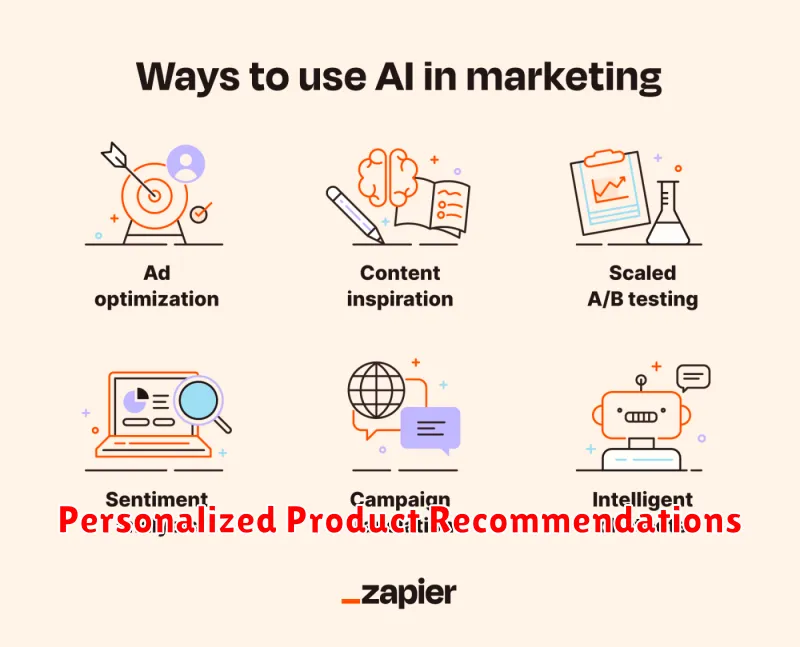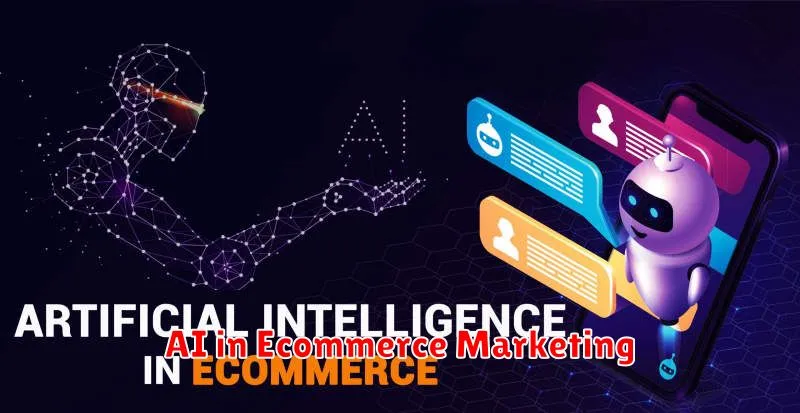The world of e-commerce is rapidly evolving, and at the heart of this transformation is artificial intelligence (AI). From personalized recommendations to automated customer service, AI is revolutionizing the way businesses engage with customers and drive sales. AI is not just a trend, it’s a game-changer, empowering e-commerce marketers with unprecedented insights and tools to optimize every aspect of their strategy, from product discovery to marketing automation.
This article will delve into the transformative power of AI in e-commerce marketing, exploring how it’s impacting key areas like customer experience, marketing automation, and data analysis. We’ll examine the benefits and challenges of integrating AI into your e-commerce strategy, and provide practical tips and examples to help you leverage the power of this cutting-edge technology to boost your online sales and build stronger customer relationships.
Understanding the Basics of AI in Ecommerce
Artificial intelligence (AI) is rapidly changing the landscape of ecommerce, offering businesses powerful tools to optimize operations, personalize customer experiences, and drive sales. Understanding the fundamental concepts of AI in ecommerce is essential for businesses looking to leverage this transformative technology.
At its core, AI in ecommerce refers to the use of algorithms and machine learning to analyze vast amounts of data and automate various tasks, resulting in improved efficiency and decision-making. These algorithms learn from past data and interactions, continuously adapting and refining their performance.
Here are some key areas where AI is making a significant impact in ecommerce:
- Personalized Recommendations: AI-powered recommendation engines analyze customer behavior, browsing history, and purchase data to suggest relevant products, increasing conversion rates and customer satisfaction.
- Chatbots and Customer Service: AI-driven chatbots provide instant customer support, answer common queries, and resolve issues, improving response times and reducing support costs.
- Pricing Optimization: AI algorithms analyze market trends, competitor pricing, and demand patterns to dynamically adjust product pricing, maximizing revenue and profit margins.
- Inventory Management: AI systems can predict demand, optimize inventory levels, and minimize stockouts, reducing warehousing costs and improving efficiency.
- Fraud Detection: AI algorithms can identify fraudulent transactions and suspicious activities in real-time, protecting businesses from financial losses.
By harnessing the power of AI, ecommerce businesses can gain valuable insights, streamline processes, and deliver personalized experiences that enhance customer satisfaction and drive growth. As AI technology continues to evolve, its impact on the ecommerce landscape is only expected to become more profound.
Personalized Product Recommendations

One of the most impactful ways AI is changing the e-commerce landscape is through personalized product recommendations. Gone are the days of generic suggestions based on browsing history. Today, AI algorithms can analyze vast amounts of data, including browsing behavior, purchase history, demographics, and even social media interactions, to deliver highly relevant recommendations tailored to each individual customer.
This level of personalization benefits both the customer and the business. For customers, it means a more enjoyable shopping experience, discovering products they genuinely might like, and potentially finding hidden gems they wouldn’t have otherwise encountered. For businesses, it translates to increased conversions, higher average order values, and stronger customer loyalty.
The effectiveness of personalized product recommendations lies in their ability to cater to individual needs and preferences. Imagine a customer browsing for a new pair of running shoes. Based on their previous purchases, browsing history, and demographic data, an AI-powered recommendation engine could suggest specific shoe models from brands they’ve liked before, with features suited for their running style and fitness level. This targeted approach, powered by AI, creates a more personalized and engaging experience, ultimately leading to greater satisfaction and conversions.
AI-Powered Chatbots for Enhanced Customer Service

In the ever-evolving landscape of e-commerce, providing exceptional customer service is paramount to success. AI-powered chatbots are emerging as a game-changer, revolutionizing the way businesses interact with their customers. These intelligent virtual assistants offer a multitude of benefits, including 24/7 availability, instant responses, and personalized interactions.
One of the most significant advantages of AI chatbots is their ability to handle a high volume of inquiries simultaneously. They can answer frequently asked questions (FAQs) and resolve simple issues without human intervention, freeing up customer service representatives to focus on more complex tasks. This leads to faster resolution times and improved customer satisfaction.
Moreover, AI chatbots can leverage data analytics to personalize customer interactions. By learning from past conversations and customer preferences, they can tailor their responses to individual needs, providing a more relevant and engaging experience. This personalized approach fosters stronger customer relationships and increases loyalty.
AI chatbots are also constantly learning and evolving. They are trained on vast amounts of data, enabling them to adapt to new situations and provide increasingly accurate and helpful responses. This continuous improvement ensures that businesses can stay ahead of the curve and deliver cutting-edge customer service.
In conclusion, AI-powered chatbots are transforming the customer service landscape in e-commerce. Their ability to provide 24/7 availability, instant responses, personalized interactions, and continuous learning makes them an indispensable tool for businesses seeking to enhance customer experiences and drive sales.
Automated Marketing Campaigns for Increased Efficiency
The rise of AI is transforming the ecommerce marketing landscape, offering businesses unparalleled opportunities to optimize their strategies and reach new heights of efficiency. One of the most impactful applications of AI is the creation of automated marketing campaigns. These campaigns leverage AI algorithms to personalize customer interactions, automate repetitive tasks, and analyze vast datasets, allowing businesses to optimize their efforts for maximum ROI.
By automating tasks like email sequencing, social media scheduling, and ad targeting, AI frees up marketing teams to focus on strategic initiatives. AI-powered tools analyze customer data to identify patterns and preferences, enabling personalized messaging and tailored content that resonates with each individual. This level of personalization fosters stronger customer relationships and boosts engagement rates.
Furthermore, AI-driven marketing campaigns empower businesses to optimize their spending through real-time data analysis. These algorithms can identify the most effective channels and target audiences, ensuring resources are allocated strategically. As a result, businesses can expect to see a significant increase in campaign efficiency and a reduction in wasted marketing dollars.
By embracing automated marketing campaigns powered by AI, businesses can streamline their operations, enhance customer engagement, and unlock new levels of growth. This technology is revolutionizing the way we market our products and services, making it a cornerstone of the future of ecommerce.
Predictive Analytics for Data-Driven Decisions
The power of AI in e-commerce marketing goes far beyond simply automating tasks. It enables businesses to make data-driven decisions that were previously impossible. One key area where AI shines is predictive analytics. This involves leveraging historical data and AI algorithms to forecast future trends, customer behavior, and outcomes.
For example, predictive analytics can help e-commerce businesses understand which products are likely to be in high demand, allowing them to optimize inventory levels and prevent stockouts. It can also identify customer segments that are most likely to respond to specific promotions or marketing campaigns, enabling targeted and more effective marketing strategies.
By analyzing customer data such as browsing history, purchase history, and interactions with marketing campaigns, AI can predict which customers are most likely to churn or make a purchase. This allows businesses to proactively address customer needs and prevent churn, ultimately leading to increased customer retention and revenue growth.
Predictive analytics empowers e-commerce businesses to move beyond reactive decision-making to a proactive approach. It allows them to anticipate customer needs, optimize operations, and personalize the shopping experience, ultimately leading to a competitive edge in the ever-evolving digital landscape.
Visual Search: The Future of Product Discovery

Visual search is a revolutionary technology that is transforming the way consumers discover products online. This technology, powered by artificial intelligence (AI), allows shoppers to use images to search for similar items. Simply snap a photo of a product you like, upload it to an app, or use your phone’s camera to search for it. AI algorithms analyze the image and match it to relevant products from a wide range of online retailers.
Visual search has the potential to completely redefine product discovery in ecommerce. It empowers consumers to find exactly what they’re looking for, even if they don’t know the name or description of the product. Think about it: you see a stylish handbag in a magazine, but you don’t know the brand. With visual search, you can snap a picture and instantly see similar bags from various stores.
Beyond making it easier for shoppers to find products, visual search also offers several benefits for businesses:
- Increased Engagement: Visual search makes online shopping more interactive and engaging, leading to longer browsing sessions and increased conversion rates.
- Improved Product Discoverability: By allowing shoppers to search by image, visual search helps retailers discover new products and expand their reach.
- Enhanced Personalization: AI algorithms learn from user searches, providing personalized product recommendations based on individual preferences.
As AI technology continues to evolve, visual search is expected to become even more sophisticated and intuitive. With features like augmented reality (AR) integration, shoppers will be able to virtually try on clothes, visualize furniture in their homes, and experience products in entirely new ways.
In conclusion, visual search is a game-changer for ecommerce marketing. It’s a powerful tool that empowers both consumers and businesses, streamlining product discovery, increasing engagement, and revolutionizing the online shopping experience.
Voice Commerce: The Rise of Voice Assistants
The world of e-commerce is rapidly evolving, and one of the most significant trends is the rise of voice commerce. Voice assistants, such as Amazon Alexa, Google Assistant, and Apple Siri, are becoming increasingly popular, and consumers are embracing the convenience of shopping with their voice. This shift towards voice-based interactions is transforming how people shop online, offering a more intuitive and personalized experience.
Voice commerce allows shoppers to make purchases verbally, using natural language commands. This hands-free approach is particularly appealing to busy consumers who value efficiency. Instead of manually navigating websites or mobile apps, shoppers can simply ask their voice assistant to add items to their cart, track orders, or get product recommendations. This streamlined process eliminates the need for typing and searching, making online shopping faster and more convenient.
The growing popularity of voice assistants is driven by several factors. First, these devices are becoming increasingly affordable and accessible, with a wide range of smart speakers and other voice-enabled devices entering the market. Second, the accuracy and natural language processing capabilities of voice assistants are improving rapidly, making them more user-friendly and intuitive. Finally, the rise of mobile commerce has paved the way for voice commerce, as consumers are already accustomed to using their smartphones for online shopping.
The emergence of voice commerce has significant implications for e-commerce marketers. Brands need to adapt their strategies to accommodate this new shopping channel. This includes optimizing product listings for voice search, creating voice-friendly content, and incorporating voice interfaces into their websites and apps. By embracing voice commerce, e-commerce businesses can cater to the evolving needs of consumers and gain a competitive edge in the digital marketplace.
AI-Powered Fraud Detection and Prevention
In the realm of e-commerce, fraud poses a significant threat to businesses and consumers alike. AI-powered fraud detection and prevention systems are revolutionizing the way businesses protect themselves and their customers. By leveraging machine learning algorithms, these systems can analyze vast amounts of data to identify suspicious patterns and anomalies that may indicate fraudulent activity.
These AI systems work by continuously learning from historical data, identifying patterns associated with fraudulent transactions. Machine learning algorithms can analyze factors like IP addresses, billing addresses, purchase history, and user behavior to detect anomalies that might be indicative of fraud. This allows businesses to proactively block fraudulent transactions, prevent chargebacks, and protect their revenue.
AI-powered fraud detection goes beyond simple rule-based systems. These systems can adapt and evolve as fraudsters develop new tactics. They can identify subtle indicators of fraud that might be missed by traditional methods, ensuring that businesses stay ahead of the curve in the ongoing battle against fraud.
The benefits of AI-powered fraud detection are significant. They can reduce chargebacks, minimize false positives, and improve customer experience. By detecting fraud quickly and accurately, these systems allow businesses to focus on legitimate customers and transactions, contributing to a more efficient and secure e-commerce environment.
The Role of AI in Inventory Management and Logistics
Artificial intelligence (AI) is revolutionizing the e-commerce landscape, and inventory management and logistics are no exception. AI-powered solutions are transforming the way businesses manage their inventory, optimize delivery routes, and ensure timely and efficient fulfillment.
One of the most significant benefits of AI in inventory management is its ability to predict demand accurately. AI algorithms can analyze historical sales data, market trends, and external factors to forecast future demand with remarkable precision. This enables businesses to optimize their inventory levels, reducing the risk of stockouts and overstocking.
AI also plays a crucial role in optimizing warehouse operations. AI-powered warehouse management systems can automate tasks such as picking, packing, and shipping, reducing manual labor and improving efficiency. By analyzing data from sensors and cameras, AI can also identify bottlenecks and optimize warehouse layout for smoother operations.
In logistics, AI is transforming the way goods are transported and delivered. AI-powered route optimization algorithms can determine the most efficient delivery routes, minimizing travel time and fuel consumption. AI can also track shipments in real-time, providing customers with accurate delivery updates and enhancing transparency.
The benefits of AI in inventory management and logistics are undeniable. By automating processes, optimizing operations, and improving forecasting accuracy, AI empowers businesses to streamline their supply chain, reduce costs, and deliver exceptional customer experiences. As AI technology continues to evolve, its role in e-commerce logistics will only become more profound, shaping the future of online retail.
Ethical Considerations of AI in Ecommerce
The integration of artificial intelligence (AI) into ecommerce is revolutionizing how businesses interact with customers, offering personalized experiences and automated processes. However, this technological advancement raises significant ethical considerations that need careful consideration.
Data privacy is a paramount concern. AI algorithms rely heavily on data, and collecting and using customer information without proper consent can lead to breaches of privacy and trust. It’s crucial for businesses to be transparent about data collection practices and provide users with clear control over their data.
Algorithmic bias is another ethical dilemma. AI algorithms are trained on existing data, which can reflect societal biases and lead to discriminatory outcomes. This could result in unfair pricing, targeted marketing based on protected characteristics, or limited opportunities for certain groups. It’s essential to ensure algorithms are trained on diverse datasets and regularly monitored for bias.
Job displacement is a potential consequence of AI adoption. Automated processes may replace human roles, raising concerns about unemployment and economic inequality. Businesses must consider the impact on their workforce and invest in training and reskilling programs to mitigate potential job losses.
Transparency and explainability are vital for building trust in AI-powered ecommerce. Consumers need to understand how AI algorithms make decisions, particularly when it comes to personalization and recommendations. Businesses should strive for transparent and explainable AI systems that provide insights into their workings.
Addressing these ethical considerations is essential for responsible and sustainable development of AI in ecommerce. By prioritizing data privacy, mitigating bias, promoting transparency, and ensuring fairness, businesses can leverage the power of AI while safeguarding the interests of their customers and society at large.
Preparing Your Business for an AI-Powered Future
The rise of AI is not a fad; it’s a fundamental shift in how businesses operate. Ecommerce, in particular, is experiencing a dramatic transformation. To thrive in this new landscape, businesses must prepare for an AI-powered future.
Here’s how you can get started:
- Embrace Data: AI thrives on data. Start collecting and organizing data from every corner of your business. This includes website traffic, customer interactions, purchase history, and more.
- Invest in AI Tools: Explore a range of AI-powered tools tailored for e-commerce marketing. From chatbots for customer service to recommendation engines for product discovery, these tools can automate tasks and boost efficiency.
- Upskill Your Team: Equip your employees with the knowledge and skills to work alongside AI. Training programs can help your team understand AI’s capabilities and how to integrate it into their workflows.
- Experiment and Learn: Don’t be afraid to experiment with different AI solutions. Start with smaller projects and gradually scale up as you gain experience. Continuously analyze results and adapt your strategies accordingly.
- Prioritize Ethical AI: As AI becomes more integrated, it’s crucial to address ethical concerns. Ensure data privacy, transparency, and fairness in your AI applications.
The future of e-commerce marketing is AI-driven. By embracing AI, businesses can unlock new opportunities for growth, efficiency, and customer satisfaction.
The Future of Personalization with AI
The rise of artificial intelligence (AI) is transforming every facet of our lives, and e-commerce is no exception. AI is empowering businesses to understand their customers better than ever before, paving the way for a new era of hyper-personalization. This means tailoring experiences to individual preferences, creating a seamless and engaging journey for every shopper.
The future of personalization with AI is driven by several key trends:
- Predictive Analytics: AI algorithms can analyze vast amounts of data to predict customer behavior, including purchase patterns, preferences, and even potential future needs. This allows businesses to anticipate customer desires and offer personalized product recommendations, promotions, and content.
- Real-Time Personalization: AI enables real-time adjustments to customer experiences based on their current interactions. This could include dynamically adjusting product recommendations based on browsing history, offering personalized discounts during checkout, or even tailoring the website layout to individual preferences.
- Conversational AI: Chatbots powered by AI are revolutionizing customer service. These intelligent assistants can answer questions, resolve issues, and even offer personalized product advice, creating a more engaging and efficient customer experience.
- Personalized Content: AI can be used to create tailored content, such as email marketing campaigns, blog posts, and social media updates, that resonate with individual customers. This ensures that marketing messages are relevant and impactful, leading to higher engagement and conversion rates.
The benefits of AI-powered personalization are significant. By understanding customer preferences and tailoring experiences accordingly, businesses can:
- Increase customer satisfaction: By offering relevant and personalized experiences, businesses can enhance customer satisfaction and loyalty.
- Boost conversion rates: Personalized recommendations and tailored offers can significantly increase conversion rates, leading to more sales.
- Reduce cart abandonment: AI can identify potential cart abandonment issues and offer personalized incentives to encourage customers to complete their purchases.
- Gain valuable customer insights: AI can provide businesses with a deep understanding of customer behavior, enabling them to make data-driven decisions and optimize their marketing strategies.
As AI technology continues to evolve, the future of personalization in e-commerce will be even more sophisticated and transformative. Businesses that embrace AI will be able to create truly personalized experiences that drive customer engagement, loyalty, and ultimately, business success.
AI and the Evolution of Customer Experience
Artificial intelligence (AI) is rapidly transforming the ecommerce landscape, and one of the most significant impacts is on customer experience. AI is enabling businesses to personalize interactions, automate processes, and deliver truly exceptional service, creating a new era of customer-centricity.
One of the most prominent ways AI is shaping customer experience is through personalization. AI algorithms can analyze vast amounts of customer data, including browsing history, purchase history, and demographics, to understand individual preferences and needs. This data-driven insights allow businesses to deliver highly tailored product recommendations, targeted promotions, and personalized content, enhancing the overall shopping experience.
Another key aspect is automation. AI-powered chatbots are becoming increasingly sophisticated, capable of handling customer inquiries, resolving issues, and providing 24/7 support. This automation not only improves efficiency but also frees up human agents to focus on more complex tasks. AI can also automate repetitive tasks like order processing and inventory management, reducing errors and improving customer satisfaction.
Furthermore, AI enables businesses to collect valuable feedback and insights from customers, leading to continuous improvement. Sentiment analysis tools leverage AI to analyze customer reviews, social media posts, and other feedback sources, identifying areas for improvement and informing strategic decisions. This data-driven approach ensures that businesses can consistently meet and exceed customer expectations.
In conclusion, AI is playing a pivotal role in the evolution of customer experience in ecommerce. By leveraging personalization, automation, and data-driven insights, businesses can create more engaging, efficient, and personalized experiences for their customers. This transformative power of AI will undoubtedly continue to shape the future of ecommerce, putting customer needs at the forefront.
Overcoming Challenges and Embracing Opportunities
The rapid adoption of AI in ecommerce marketing presents both challenges and opportunities. One significant hurdle is the data privacy concern. As AI systems heavily rely on user data for optimization, ensuring data security and compliance with regulations is crucial. This involves transparent data usage policies and robust security measures to protect consumer information.
Another challenge is the lack of AI expertise within many organizations. Implementing and managing AI-powered tools requires a skilled workforce with specialized knowledge. Companies need to invest in training and upskilling their teams to leverage AI effectively. Additionally, fostering a collaborative culture between data scientists, marketers, and other stakeholders is vital for successful AI integration.
Despite these challenges, AI offers incredible opportunities for ecommerce marketers. The most prominent advantage is personalized customer experiences. AI can analyze customer behavior and preferences to deliver tailored product recommendations, targeted promotions, and customized content, leading to increased engagement and conversions. AI also empowers marketers to automate repetitive tasks, such as email marketing and social media management, freeing up time for strategic initiatives.
Furthermore, AI-driven predictive analytics provides valuable insights into customer behavior and market trends. This information can inform pricing strategies, inventory management, and product development decisions, optimizing business operations and boosting profitability. Overall, embracing AI is essential for ecommerce businesses to stay competitive and thrive in the evolving digital landscape.
AI: The Key to Unlocking Ecommerce Growth
The rise of artificial intelligence (AI) has brought about a seismic shift in the ecommerce landscape. It’s no longer a futuristic concept; it’s a powerful tool that’s transforming how businesses operate and interact with their customers. From personalized recommendations to streamlined operations, AI is rapidly becoming the key to unlocking unprecedented growth in ecommerce.
AI’s ability to analyze massive amounts of data enables hyper-personalization, a key factor in driving conversions. By understanding customer behavior and preferences, ecommerce businesses can tailor product recommendations, promotions, and even website experiences, resulting in a more engaging and fulfilling shopping journey.
Beyond customer interactions, AI is revolutionizing ecommerce operations. AI-powered chatbots are transforming customer service by providing instant support and resolving inquiries efficiently. AI algorithms are also optimizing pricing strategies, inventory management, and fraud detection, leading to cost savings and improved efficiency.
AI is not just a trend; it’s a game-changer that’s empowering ecommerce businesses to stay ahead of the curve. By leveraging AI’s capabilities, businesses can unlock new growth opportunities, enhance customer experiences, and ultimately, drive success in the increasingly competitive online marketplace.

